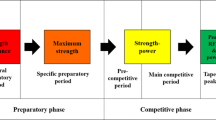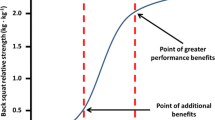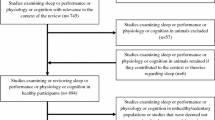Abstract
Purpose
Mental fatigue can negatively impact on submaximal endurance exercise and has been attributed to changes in perceived exertion rather than changes in physiological variables. The impact of mental fatigue on maximal anaerobic performance is, however, unclear. Therefore, the aim of the present study was to induce a state of mental fatigue to examine the effects on performance, physiological and perceptual variables from subsequent tests of power, strength and anaerobic capacity.
Methods
Twelve participants took part in the single-blind, randomised, crossover design study. Mental fatigue was induced by 90 min of the computer-based Continuous Performance Task AX version. Control treatment consisted of 90 min of watching emotionally neutral documentaries. Participants consequently completed countermovement jump, isometric leg extension and a 3-min all-out cycling tests.
Results
Results of repeated measures analysis of variance and paired t tests revealed no difference in any performance or physiological variable. Rating of perceived exertion tended to be greater when mentally fatigued (mental fatigue = 19 ± 1 vs control = 18 ± 1, p = 0.096, \(\eta^{2}_{\text{p}}\) = .232) and intrinsic motivation reduced (mental fatigue = 11 ± 4 vs control = 13 ± 6, p = 0.063, d = 0.597) in the mental fatigue condition.
Conclusions
Near identical responses in performance and physiological parameters between mental fatigue and control conditions suggest that peripheral mechanisms primarily regulate maximal anaerobic exercise. Whereas mental fatigue can negatively impact submaximal endurance exercise, it appears that explosive power, voluntary maximal strength and anaerobic work capacity are unaffected.




Similar content being viewed by others
Abbreviations
- 3MT:
-
Three-minute all-out cycle test
- ANOVA:
-
Analysis of variance
- AX-CPT:
-
Continuous performance test AX version
- CMJ:
-
Countermovement jump
- CON:
-
Control
- EMG:
-
Electromyography
- MF:
-
Mental fatigue
- POMS:
-
Profile of mood states
- RPE:
-
Rating of perceived exertion
- RSME:
-
Rating scale of mental effort
- SIMS:
-
Situational intrinsic motivation scale
Refe rences
Amann M (2011) Central and peripheral fatigue: interaction during cycling exercise in humans. Med Sci Sports Exerc 43:2039–2045. doi:10.1249/MSS.0b013e31821f59ab
Bakeman R (2005) Recommended effect size statistics for repeated measures designs. Behav Res Methods 37:379–384. doi:10.3758/BF0319270
Balog EM, Thompson LV, Fitts RH (1994) Role of sarcolemma action potentials and excitability in muscle fatigue. J Appl Physiol 76:2157–2163
Bartlett FC (1943) Ferrier lecture: fatigue following highly skilled work. Proc R Soc Lond B Biol Sci 131:247–257. doi:10.1098/rspb.1943.0006
Beaver WL, Wasserman K, Whipp BJ (1986) A new method for detecting anaerobic threshold by gas exchange. J Appl Physiol 60:2020–2027
Boksem MA, Tops M (2008) Mental fatigue: costs and benefits. Brain Res Rev 59:125–139. doi:10.1016/j.brainresrev.2008.07.001
Boksem MA, Meijman TF, Lorist MM (2005) Effects of mental fatigue on attention: an ERP study. Brain Res Cogn Brain Res 25:107–116. doi:10.1016/j.cogbrainres.2005.04.011
Borg G (1970) Perceived exertion as an indicator of somatic stress. Scand J Rehabil Med 2:92–98
Borg G (1982) Psychophysical bases of perceived exertion. Med Sci Sports Exerc 14:377–381. doi:10.1249/00005768-198205000-00012
Bray SR, Martin Ginis KA, Hicks AL, Woodgate J (2008) Effects of self-regulatory strength depletion on muscular performance and EMG activation. Psychophysiology 45:337–343. doi:10.1111/j.1469-8986.2007.00625.x
Bray SR, Graham JD, Martin Ginis KA, Hicks AL (2012) Cognitive task performance causes impaired maximum force production in human hand flexor muscles. Biol Psychol 89:195–200. doi:10.1016/j.biopsycho.2011.10.008
Brownsberger J, Edwards A, Crowther R, Cottrell D (2013) Impact of mental fatigue on self-paced exercise. Int J Sports Med 34:1029–1036. doi:10.1055/s-0033-1343402
Burnley M, Doust JH, Vanhatalo A (2006) A 3-min all-out test to determine peak oxygen uptake and the maximal steady state. Med Sci Sports Exerc 38:1995–2003. doi:10.1249/01.mss.0000232024.06114.a6
Carter CS, Braver TS, Barch DM, Botvinick MM, Noll D, Cohen JD (1998) Anterior cingulate cortex, error detection, and the online monitoring of performance. Science 280:747–749
Coggan AR, Coyle EF (1991) Carbohydrate ingestion during prolonged exercise: effects on metabolism and performance. Exerc Sports Sci Rev 19:1–40
Cohen J (1992) A power primer. Psychol Bull 112:155–159. doi:10.1037/0033-2909.112.1.155
Crewe H, Tucker R, Noakes TD (2008) The rate of increase in rating of perceived exertion predicts the duration of exercise to fatigue at a fixed power output in different environmental conditions. Eur J Appl Physiol 103:569–577. doi:10.1007/s00421-008-0741-7
Davis JM, Zhao Z, Stock HS, Mehl KA, Buggy J, Hand GA (2003) Central nervous system effects of caffeine and adenosine on fatigue. Am J Physiol Regul Integr Comp Physiol Rev 284:R399–R404
Deci EL (1971) Effects of externally mediated rewards on intrinsic motivation. J Pers Soc Psychol 18:105–115. doi:10.1037/h0030644
Deci EL (1972) Effects of contingent and non-contingent rewards and controls on intrinsic motivation. Organ Behav Hum Perf 8:217–229. doi:10.1016/0030-5073(72)90047-5
Di Salvo V, Gregson W, Atkinson G, Tordoff P, Drust B (2009) Analysis of high intensity activity in premier league soccer. Int J Sports Med 30:205–212. doi:10.1055/s-0028-1105950
Fitt RH, Metzger JM (1993) Mechanisms of muscular fatigue. In: Poortmans JR (ed) Principles of Exercise Biochemistry, vol 38, 2nd edn. S. Karger AG, Farmington, pp 248–268
Ford KR, van den Bogert J, Myer JD, Shapiro R, Hewett TE (2008) The effects of age and skill level on knee musculature co-contraction during functional activities: a systematic review. Br J Sports Med 42:561–566. doi:10.1136/bjsm.2007.044883
Foster C, de Koning JJ, Hettinga F, Lampen J, Dodge C, Bobbert M, Porcari JP (2003) Pattern of energy expenditure during simulated competition. Med Sci Sports Exerc 35:826–831
Gandevia SC (2001) Spinal and supraspinal factors in human muscle fatigue. Physiol Rev 81:1725–1789
Guay F, Vallerand RJ, Blanchard CM (2000) On the assessment of state intrinsic and extrinsic motivation: the situational motivation scale (SIMS). Motiv Emot 24:175–213. doi:10.1023/A:1005614228250
Hallett M (2007) Volitional control of movement: the physiology of free will. Clin Neurophysiol 118:1179–1192. doi:10.1016/j.clinph.2007.03.019
Holding D (1983) Fatigue stress and fatigue in human performance. Wiley, Durham
Hübner-Wozniak E, Kosmol A, Lutoslawska G, Bem EZ (2004) Anaerobic performance of arms and legs in male and female free style wrestlers. J Sci Med Sport 74:473–480. doi:10.1016/S1440-2440(04)80266-4
Lorist MM, Boksem MAS, Ridderinkhof KR (2005) Impaired cognitive control and reduced cingulate activity during mental fatigue. Cognit Brain Res 24:199–205. doi:10.1016/j.cogbrainres.2005.01.018
Lovatt D et al (2012) Neuronal adenosine release, and not astrocytic AtP release, mediates feedback inhibition of excitatory activity. Proc Natl Acad Sci USA 109:6265–6270. doi:10.1073/pnas.1120997109
Marcora SM, Staiano W, Manning V (2009) Mental fatigue impairs physical performance in humans. J Appl Physiol 106:857–864. doi:10.1152/japplphysiol.91324.2008
McNair DM, Lorr M, Droppleman LF (1985) Profile of mood states manual. Educational and Industrial Testing Services, San Diego
Meijman TF (2000) The theory of the stop-emotion: on the functionality of fatigue. In: Pogorski D, Karwowski W (eds) Ergonomics and safety for global business quality and production. CIOP, Warschaw, pp 45–50
Morton RH (2006) The critical power and related whole-body bioenergetic models. Eur J Appl Physiol 96:339–354. doi:10.1007/s00421-005-0088-2
Noakes TD (2012) Fatigue is a brain-derived emotion that regulates the exercise behavior to ensure the protection of whole body homeostasis. Front Physiol 3:1–13. doi:10.3389/fphys.2012.00082
Nummela A, Vuorimaa T, Rusko H (1992) Changes in force production, blood lactate and EMG activity in the 400‐m sprint. J Sport Sci 10:217–228. doi:10.1080/02640419208729920
Paavolainen L, Häkkinen K, Hämäläinen I, Nummela A, Rusko H (1999) Explosive-strength training improves 5-km running time by improving running economy and muscle power. J Appl Physiol 86:1527–1533
Pageaux B, Marcora S, Lepers L (2013) Prolonged mental exertion does not alter neuromuscular function of the knee extensors. Med Sci Sports Exerc 45:2254–2264. doi:10.1249/MSS.0b013e31829b504a
Pageaux B, Lepers R, Dietz KC, Marcora SM (2014) Response inhibition impairs subsequent self-paced endurance performance. Eur J Appl Physiol 114:1–11. doi:10.1007/s00421-014-2838-5
Paus T, Koski L, Caramanos Z, Westbury C (1998) Regional differences in the effects of task difficulty and motor output on blood flow response in the human anterior cingulate cortex: a review of 107 PET activation studies. NeuroReport 9:R37–R47
Rampinini E, Coutts AJ, Castagna C, Sassi R, Impellizzeri FM (2007) Variation in top level soccer match performance. Int J Sports Med 28:1018–1024. doi:10.1055/s-2007-965158
Riccio CA, Reynolds CR, Lowe P, Moore JJ (2002) The continuous performance test: a window on the neural substrates for attention? Arch Clin Neuropsychol 17:235–272. doi:10.1093/arclin/17.3.235
Rozand V, Lebon F, Papaxanthis C, Lepers R (2014) Does a mental-training session induce neuromuscular fatigue? Med Sci Sports Exerc 46:1981–1989. doi:10.1249/MSS.0000000000000327
Rozand V, Pageaux B, Marcora SM, Papaxanthis C, Lepers R (2014) Does mental exertion alter maximal muscle activation? Front Hum Nuerosci. doi:10.3389/fnhum.2014.00755
Rudebeck PH, Walton ME, Smyth AN, Bannerman DM, Rushworth MF (2006) Separate neural pathways process different decision costs. Nat Neurosci 9:1161–1168. doi:10.1038/nn1756
Silvestrini N, Gendolla GH (2007) Mood effects on autonomic activity in mood regulation. Psychophysiology 44:650–659. doi:10.1111/j.1469-8986.2007.00532.x
Snow A, LeUnes A (1994) Characteristics of sport research using the profile of mood states. J Sport Behav 17:207–211
Standage M, Duda JL, Treasure DC, Prusak KA (2003) Validity, reliability, and invariance of the situational motivation scale (SIMS) across diverse physical activity contexts. J Sport Exerc Psychol 25:19–43
Taylor K, Hopkins W, Chapman DW, Cronin JB, Newton MJ, Cormack S, Gill N (2012) Monitoring neuromuscular fatigue using vertical jumps. Dissertation, Edith Cowan University
Thompson K (2014) Pacing: Individual strategies for optimal performance. Human Kinetics, Champaign
van der Linden D, Frese M, Meijman TF (2003) Mental fatigue and the control of cognitive processes: effects on perseveration and planning. Acta Psychol (Amst) 113:45–65. doi:10.1016/S0001-6918(02)00150-6
Vanhatalo A, Doust JH, Burnely M (2007) Determination of critical power using a 3-min all-out cycling test. Med Sci Sports Exerc 39:548–555. doi:10.1249/mss.0b013e31802dd3e6
Vansteenkiste M, Deci EL (2003) Competitively contingent rewards and intrinsic motivation: can losers remain motivated? Motiv Emotion 27:273–299. doi:10.1023/A:1026259005264
Verwy WB, Veltman HA (1996) Detecting short periods of elevated workload: a comparison of nine workload assessment techniques. J Exp Psychol 2:270–285. doi:10.1037/1076-898X.2.3.270
Walton ME, Bennerman DM, Alterescu K, Rushworth MF (2003) Functional specialisation within medial frontal cortex of the anterior cingulated for evaluating effort-related decisions. J Neurosci 23:6475–6479
Walton ME, Kennerley SW, Bannerman DM, Phillips PE, Rushworth MF (2006) Weighing up the benefits of work: behavioral and neural analyses of effort-related decision making. Neural Netw 19:1302–1314. doi:10.1016/j.neunet.2006.03.005
Williamson JW, McColl R, Mathews D, Mitchell JH, Raven PB, Morgans WP (2001) Hypnotic manipulation of effort sense during dynamic exercise: cardiovascular responses and brain activation. J Appl Physiol 90:1392–1399
Williamson JW, McColl R, Mathews D, Mitchell JH, Raven PB, Morgan WP (2002) Brain activation by central command during actual and imagined handgrip under hypnosis. J Appl Physiol 92:1317–1324. doi:10.1152/japplphysiol.00939.2001
Williamson JW, Fadel PJ, Mitchell JH (2006) New insights into central cardiovascular control during exercise in humans: a central command update. Exp Physiol 91:51–58. doi:10.1113/expphysiol.2005.032037
Zijlstra FRH (1993) Effciency in work behavior: a design approach for modern tools. Delft University Press, Delft
Conflict of interest
The authors declare that they have no conflict of interest.
Ethical standards
The experiments conducted for the present manuscript comply with current laws of Australia.
Author information
Authors and Affiliations
Corresponding author
Additional information
Communicated by Jean-René Lacour.
Rights and permissions
About this article
Cite this article
Martin, K., Thompson, K.G., Keegan, R. et al. Mental fatigue does not affect maximal anaerobic exercise performance. Eur J Appl Physiol 115, 715–725 (2015). https://doi.org/10.1007/s00421-014-3052-1
Received:
Accepted:
Published:
Issue Date:
DOI: https://doi.org/10.1007/s00421-014-3052-1




